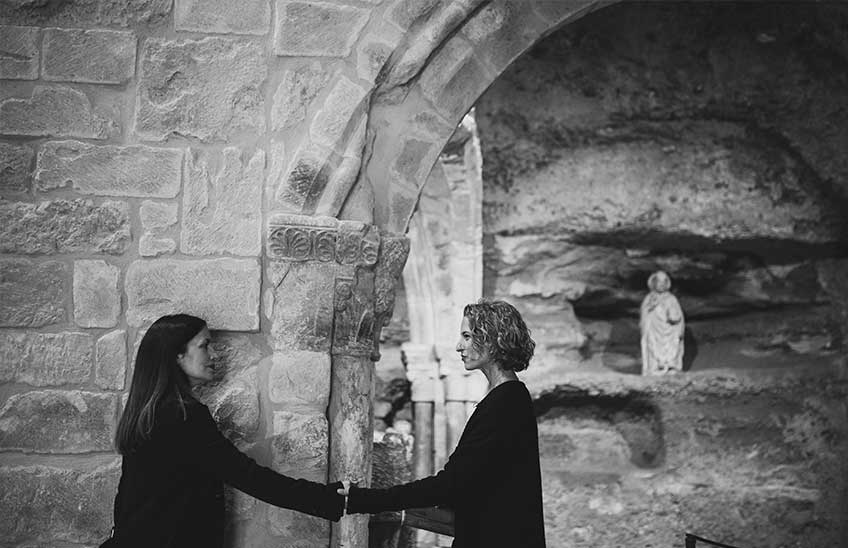The cycle Los Clásicos Hoy returns to the MUN with a poetic-musical recital that vindicates the value of women writers of the 16th and 17th centuries.
Tan sabia como valerosa' is directed by playwright Ignacio García and has the collaboration of the Instituto Cervantes,

FotoInstitutoCervantes/Image of the show As wise as she is courageous
22 | 11 | 2023
The Museo Universidad de Navarra is celebrating this month a new edition of Los Clásicos HoyThe cycle that vindicates the classic works from a contemporary point of view. The proposal kicks off this Thursday, November 23 (7:30 p.m.), with As wise as courageousa poetic-musical recital that vindicates the value and relevance of female poets, writers and playwrights of the 16th and 16th centuries. The show, directed by Ignacio García, stage director, playwright and former director of the Almagro International Classical Theater Festival, has the collaboration of the Cervantes Institute. Tickets cost 12 euros.
The tour approaches the verses of authors such as María de Zayas, Ana Caro de Mallén, Sor Juana Inés de la Cruz, Santa Teresa de Ávila, Ángela de Azevedo and Sor María do Ceo and discovers the difficulties they had to face, while recognizing the richness of the female literary world of the time. On stage, actresses Lara Grube and Carmen del Valle, singer Rita Barber and harpist and singer Sara Águeda give them voice, music and presence.
Director Ignacio García points out that the voices of these women authors "have been unjustly silent and hidden for a long time, and to keep that legacy in the shadows is to renounce an important and virtuous part of our classical heritage, so rich and varied. Introducing these women into our classical canon not only restores 50% of the artistic population so forgotten, but gives a very broad picture of the aesthetics, philosophies and poetics in which our Renaissance and Baroque developed."
NECESSARY REPAIR
He also claims that "the messages of their works are as diverse as they are themselves, and have enormous relevance in current issues such as the feminist struggle, intellectual and economic emancipation, as well as love, of women, religious dissidence, power, love, justice .... But always from a feminine and luminous sensibility that is tremendously surprising for what we know of them. Mujeres de hoy diciendo los textos de mujeres de siempre supposes a necessary reparation, by presence and by vindication, of a forgotten common patrimony.
On the selection of the authors, she explains that it has been "natural and organic, taking into account the enormous quality of the texts above all, but also the relevance they had in their universes: Sister Ana and Saint Teresa in mysticism and poetry; Ana Caro and Ángela de Acevedo in theater; María de Zayas in the novel and also in theater; Zaida in poetry; and Sor Juana, who was a true monster of knowledge (she defined herself as such) in everything. It was difficult to choose because there is so much excellent material. We also wanted a balance between what was said and what was sung to give the show the beauty of sound, since they were all musicians as well, and of listening to the virtue of our language in very varied affections and airs".
The result, in the words of the director, is "a fascinating journey through the sound of our language, invented by women who wrote it centuries ago and others who say and sing it today, both full of talent, and with a delicacy in the nuances that moves and transforms. It will be a feast of the spoken word, in the sense of saying and in the sense of joy and happiness. It is difficult for me to call it a recital because, although the format is similar, it proposes a deep and inner journey to hidden places of the soul, and because it appeals much more to the sensory and the spiritual, to the enjoyment of sounds and emotions than to rational or academic contemplation".
The work, whose seed began to grow within the Cervantes Institute with the recital that took place in an exhibition of the same name, continued to develop in other venues: the Almagro Festival, with a look at Portugal, which was the guest country; at the International Congress of the Spanish Language with Las niñas de Cádiz doing chirigota on texts by women; and in Voces de la Lengua, in San Millán de la Cogolla in the Monastery of Suso and in Santa María la Real de Nájera, in an ascetic and mystical vision in keeping with the places. And now in Pamplona, where you can listen to the Navarre born in La Rioja, Sister Ana de la Trinidad, "excellent poetess, mystic and sonneteer of the late sixteenth and early seventeenth centuries". "It is fascinating how a show can dialogue with the surroundings when there are talented performers who are sensitive to the beauty and sound of the places, and that is what we are going to do at the MUN as well, to add to this pilgrimage of words and virtue," García says.